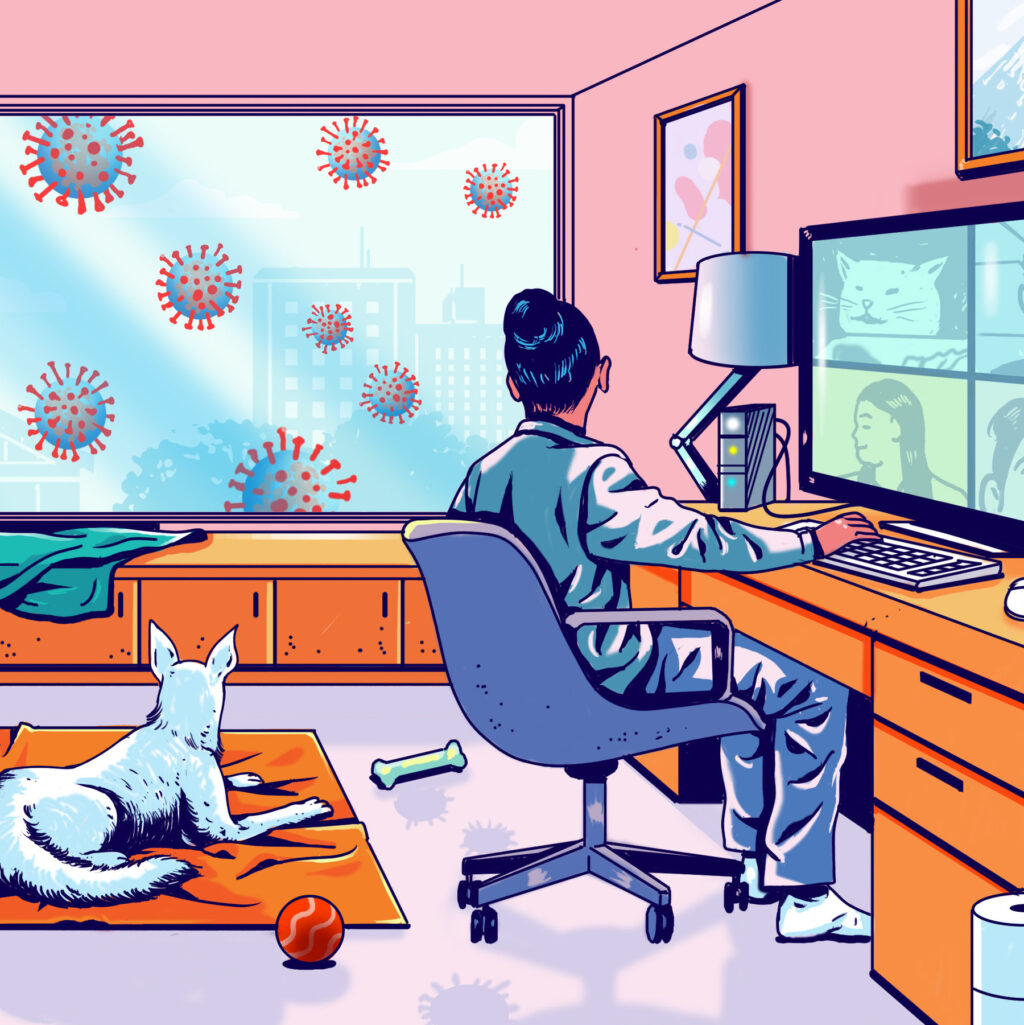Why do humans find it hard to stay at home?


Designed by Saravanan Senthil
You’ve got your eyes on the prize: it’s a plump catch. It’ll make for quite the feast when you get back home. Ah, the very thought of home brings a smile to your face. With a sense of triumph at having found such a fine specimen, you release the arrow -only to see it bounce off the animal and fall to the ground. As the sense of bewilderment consumes you, the animal locks your puny figure in its sights and charges. The adrenaline levels in your body upsurge and the hormone gushes through your arteries to every muscle tissue. You run. It catches you. You’re dead.
Our early ancestors, the hunter-gatherers, were quick to realise that surviving alone wasn’t easy. Getting enough calories, staying safe and warm or caring for offspring was practically impossible alone. This led to our brains becoming more and more fine-tuned to recognise what others thought and felt, and to form and sustain social bonds. Thus, with time, being social became a part of our biology. Being together meant survival. Natural selection took care of the ones who differed. In a nutshell – humans have evolved into the social beings they are today primarily because of the need for communication between one and other in the Paleolithic era.
Jump to today’s world, we can see how the above is an example of why the human species has evolved to be what it currently is: a huge network consisting of over 7.7 billion people all working together and, in the process, stepping outside their houses.
Be it for educational purposes, job-related, or just to go out and have a good time with your pals, we socialise. Despite the modern age allowing us to be so well connected to one and other via the internet, we just can’t seem to match the ‘vibe’ of being around these people in person.
A lack of this interaction does trigger our biological response of feeling lonely. The level of cortisol, a stress hormone, goes up. This impairs the body’s cognitive performance, compromises the immune system and increases your risk for vascular problems, inflammation and heart diseases. Observing this phenomenon through a psychological lens, if we fall short of these deep/social connections that we crave (which are realistically not so easy to find), the emotional distress that follows has been shown to be associated with increased pain perception, thus not limiting the pitfall caused by loneliness to the mental level but having adverse effects on one’s physical being.
It is well known that your mental well-being is strongly correlated to the state of your physical well-being. Exercise is one of the methods taken by people to ensure a solid state of physical fitness, but how exactly does this affect your mental state of mind? Why is it such a key factor in wanting to leave the house?
Endorphins, the body’s natural morphine masks the feeling of pain. This hormone allowed our ancestors to run from predators when injured. While running away from predators isn’t a situation faced by an everyday Joe, exercise causes a similar release of endorphins into one’s body resulting in a palpable feeling of euphoria, lack of receptiveness to pain. Thus people who exercise experience an improved mood, reduced stress and increased satisfaction in oneself, decreasing one’s chances of falling prey to depression. The above has been shown to occur when the levels of dopamine and serotonin increase along with endorphins. Speaking of things that make one happy you could also argue that eating a doughnut or two would give you the same amount of pleasure (afterall, ‘pleasure’ is just the sensation caused by the release of a hormone) and while that certainly is easier and sounds way more delicious, you’d still have to go out to grab one or to get the ingredients to make one and satisfy yourself. Further psychological and biological studies have linked a healthy body to a healthy mind.
Clearly, exercise – be it a small walk around the block or a full blown workout- has multiple effects on one’s body and while there are exercises that can be done at home, nothing beats an early morning jog outside with all the fresh air or a solid training session with your mates at the gym. People know about the perks of staying physically fit and that makes it all the more harder to stay bottled up at home for long periods of time.
Speaking of a healthy mind, when I asked people what their definition of a healthy mind is, most of them replied with something along the lines of “A happy mind is a healthy mind”. If I were to ask you, “What is the one thing you’d want in order to be happy?”. What would your answer be? Money? A Maserati? A Mansion? A trip to the Moon? While all of the above are undoubtedly very appealing in their own sense, my answer differs ever so slightly. The one thing that I’d love to have in my life is a sense of satisfaction in things that I do. To be satisfied with who I am as a person. To put it in a slightly less crude sense, the thing I’d yearn to possess is validation.
The sense of satisfaction/validation is something that everyone has experienced in life be it in the form of appreciation from your parents on something you’ve done or from your team when together you have achieved what you’ve set out to do. A closer inspection of the latter makes it evident that it is the completion of a task (it need not be academic/job related as such) that gives us a sense of validation, this end result can only be achieved after putting your back into it. As well as providing for one’s bread and butter, work allows us to experience the joy in focussing on a task at hand. People have many motives to work, be it for the betterment of the environment and thus mankind, to break records, for others entertainment or for the country. The list goes on, but the question still remains, why work? The simple answer is, we do it to feel good about ourselves. It is also interesting to note that people can develop a tendency to associate places with a task, be it sleeping or indulging in an activity thus boosting efficiency and the want to focus on the task at hand. Take the example of the workspaces at Microsoft or Youtube, these companies understand that providing the right environment for work as well as ensuring a relaxed yet determined state of mind of its employees is crucial in order to get the best out of them and meet deadlines on time.The concepts from the psychological theory of place attachment are clearly visible as we can see companies investing into good quality infrastructure (even beds in offices!) and open areas in order to keep the morale of the workers high and make them associate the office space with a sense of productivity and enjoyment rather than a cold grey cubicle of misery. It results from the same theory that some people find it hard to stay productive at home which is very natural but the lack of task accomplishment can surprisingly inundate an individual, leading to restlessness which is the crude way of hinting at increased stress levels.
In a world in the midst of a global pandemic, us humans have seemingly acted very counter-intuitively and naively, directly disobeying safety notices issued by the government, hoarding supplies and not thinking twice about the needs of others. These imprudent actions just go to show how much human beings, like other physical items in nature, display the quality of inertia, the lack of willingness to digest the situation and change our ways. despite there being multiple warnings and actions being taken against people going out, we continue to see posts of people out and about. As bemusing and alarming as it is, these visuals subconsciously affect us. As the days go by, it is up to us to think twice about heading out, be it for work (there are a fair number of blue collar workers whose lives depend on moving from place to place, staying at home is associated with unemployment for many), or to purchase essentials. Recently, the phrase “learning to live with the virus” has made an emergence and I feel that while the idea may seem irrational and totally absurd, this quarantine has given us time to learn what are the do’s and don’ts for when the need to step outside arises. It is imperative that we comply with the health and safety measures, only trust reputed news sources and not get inundated by the ubiquitous influence of fake news. Finally we should spare thought for how our decisions will impact others as we have to stand united in the fight against COVID-19.
Author: Sreeharsha Paruchuri
Editor: Kripa Anne
Designer: Saravanan Senthil

 We Are So Cooked
We Are So Cooked  A CCC Response to ‘Campus Canine Affairs’
A CCC Response to ‘Campus Canine Affairs’  Campus Canine Affairs
Campus Canine Affairs  QIF Review: A peek into IIIT’s Quarantine Facilities
QIF Review: A peek into IIIT’s Quarantine Facilities  The First Inter-House Contest of the Year – Valorant
The First Inter-House Contest of the Year – Valorant  Sheets to Lull To
Sheets to Lull To  A perspective on sports in IIIT
A perspective on sports in IIIT  Paintings of IIIT
Paintings of IIIT  The Tale of Jagruti
The Tale of Jagruti  Cleaning up the Mess?
Cleaning up the Mess?
1 thought on “Why do humans find it hard to stay at home?”
Comments are closed.